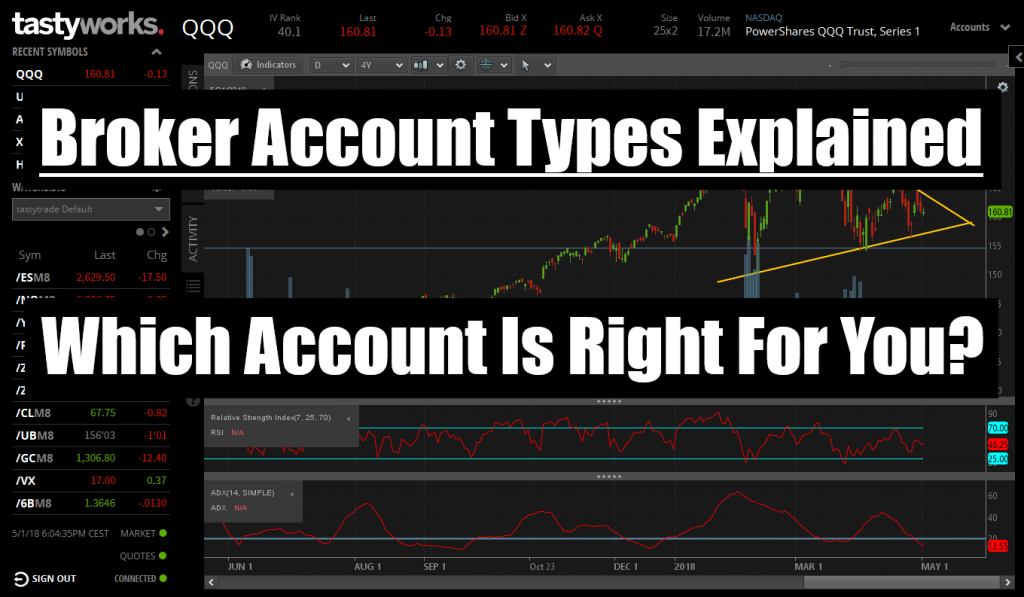Choosing a broker to trade is unavoidable for retail traders. But the sign-up and set up process can be confusing for newcomers. Probably the first most confusing choice when signing up for a broker is the account type choice. Most brokers offer a wide variety of different account types. Just to mention a few: Individual, IRA, Custodial, Joint, (cash vs margin account)… All of them differ from each other, some a lot and some only in a few aspects. In this article, I will walk you through each and every relevant account type, so you know which is the best possible choice for you.
Individual Accounts
Broker accounts can be owned by one or more individuals or even companies. First of all, I will present the different standard individual account types, so the brokerage account types with only one owner. These are the most commonly used brokerage account types.
Individual Cash Accounts
The first and most standard brokerage account type is an individual cash account. Traders with this account type usually are allowed to trade all available asset types as long as there is enough money to cover the entire position. If a trader with a cash account wants to buy 100 shares of XYZ stock and XYZ is trading at $250, the trader’s buying power would be reduced by $25 000 (100 * $250). This may sound logical to some people. Theoretically, it makes sense that a trader should be able to cover his entire position with his own money. But this often leads to a very fast reduction in buying power, especially if you want to trade multiple assets at a time. If you want to trade many assets at once in cash accounts, you usually need a lot of capital.
Another clear disadvantage of cash accounts is that you can’t trade any naked options/undefined risk strategies. Selling options without protection, shorting stocks etc. are all things that aren’t allowed in cash accounts.
One definite advantage of cash accounts is that you can’t lose more money than you have in the account. This isn’t necessarily the case for all other account types.
Individual Margin Accounts
The next individual account type is the individual margin account. This is a little more flexible than an individual cash account because you don’t need to be able to cover your entire position’s purchase price. In margin accounts, you are able to borrow money from your broker. This might sound scary but as long as you know what you are doing, it isn’t that bad. As you can borrow money, your buying power is reduced much less per position than it would be in cash accounts. Trading multiple positions at once is much easier in margin accounts.
Let’s look at the example with stock XYZ again. The trader with a cash account had his buying power reduced by $25 000 for a purchase of 100 shares (XYZ’s price: $250). This same trade would only reduce the buying power by $12 500 or even less (depending on the broker) in a margin account. Thereby, a trader would save at least $12 500 of buying power which he can use for another position.
Selling naked options or shorting stocks (trading undefined risk strategies) is allowed in margin accounts.
Nevertheless, margin accounts have their disadvantages as well. One disadvantage is that you can lose more money than you allocated in some broker platforms. Therefore, you really should be aware of your risks in margin accounts. Never overleverage yourself/trade too big. Generally, margin accounts can have some additional rules to reduce the broker’s risk. To learn more about specific rules, I recommend asking your broker as this isn’t the same for all brokers.
Retirement Accounts
Another popular individual account type is a retirement account. There are quite a few different individual retirement accounts (IRAs). The differences between these account types aren’t clear to most people. That’s why I want to present them now. Individual Retirement Accounts offer different tax advantages over standard individual account types. However, IRAs also come with some limitations. For example, you usually can’t use margin in IRAs. You typically can’t short sell stocks in IRAs either. Furthermore, most IRAs don’t allow you to sell naked options.
Traditional IRA
Traditional Individual Retirement Accounts allow you to deposit a certain amount of your income annually without paying taxes on it. However, when withdrawing gains made from this deposited money, you will have to pay taxes on it.
Roth IRA
You can’t deposit income tax-free to Roth IRAs. But when withdrawing gains made from this money, you won’t have to pay any taxes on it.
These are the most common retirement accounts. In addition to them, there exist other IRAs for example, for self-employed people.
When picking an IRA, you should consider your income, tax bracket, expected return etc.
Joint Accounts
Joint accounts are account types owned by more than one person. Once again, there are multiple different Joint account types.
Joint Tenants with Rights of Survivorship
In this Joint account type, all owners own an equal share of the available assets/capital. Thus usually, all parties are able to allocate and trade with the deposited money. If one party passes away, all assets will be in full ownership of the remaining owner(s).
Tenants in Common
In this account type, both owners own a certain proportion of the deposited funds/assets. If one of the owners passes away, the other owner does not receive all assets of the deceased person.
Custodial Accounts
Custodial accounts are another account that doesn’t necessarily have an individual owner. Custodial accounts are set up by a custodian who must be over the age of majority (usually 18). The custodian can manage assets on behalf of a minor. But note that all assets are owned by the minor. When the minor reaches the age of majority, the account and all its assets will be gifted to him/her. Before that, the minor is normally not allowed to place trades. All trading has to be done by the custodian.
Trust Accounts
A trust account is an account in which a trustee controls the funds/assets for the benefit of another party. The trust can be in their own name or the name of another individual. They can be especially useful in estate planning, as they generally bypass the probate process and can deliver assets to beneficiaries fast.
Corporate Accounts
Corporate accounts can be opened by legal entities/corporations. To set up a corporate account, you will need a Corporate Agreement, Tax ID number and more. Corporate accounts usually are used by one or more authorized corporate officers that may trade on behalf of the corporation. Usually, corporate accounts, if set up correctly, don’t have margin restrictions.
Conclusion – What Account Type Is Right For You?
This obviously depends on you! But as long as you just want to trade with your own money for yourself, you probably should open an individual margin or cash account. If you want to save up for your retirement and want to enjoy tax benefits, you could also open an Individual Retirement Account. But remember that these can come with restrictions. Therefore, there is no one right account type for everyone. It really depends on personal preferences (trading style, goal, situation, time…)
Note that not all of the discussed brokerage account types are available in all countries. The discussed account types should all be available in the US. But something like an individual cash or margin account is very likely available in your country as well.
Furthermore, not all brokers offer all account types. You have to check the desired brokers website or contact their support to find out if they offer your account type. But once again, almost every broker should offer individual margin and cash accounts. Some of the account types may also have further or fewer restrictions depending on the broker. For example, Tastyworks (my preferred broker) allows you to sell naked calls in IRAs. So make sure to ask your broker.
What Is The Best Brokerage Account Type For Options Trading?
For options trading, I really recommend an (individual) margin account. This is because an option trader needs the flexibility to both buy and sell options. Selling options isn’t allowed in most other account types. This reason alone is enough for me to recommend margin accounts over all other account types (for option traders).
The Broker Tastyworks Offers All The Above Broker Account Types. You Can Read My Tastyworks Review Here!


Hey Louis,
Thanks for the article. Based on your recommendations I am keen to look at cash accounts – I want to invest a small amount to begin with then build my investment as I gain confidence, are there certain brokers you would recommend a beginner like me looking at? Thankyou for your help!
Cheers,
Mike
Great plan Mike! My number 1 broker recommendation is Tastyworks. You can read my full TastyWorks Review here.
This is a very good introduction to options accounts. I will have to act on them because I do want to trade penny stocks and I like how you explain margins and leverage in simple terms. I like how each section is broken down and gives me an overview of what to expect. The corporate account I never heard of but thanks for telling me because I am thinking of buying stocks via an LLC. Nice work!
Great to hear that you enjoyed the article!
Hi Louis,
This is indeed a great article. I enjoyed reading it. Very helpful article.
I have a Margin broker account. Its written on my name and my wife. I indeed need a Margin account since I am selling naked options [puts], and sometime I even using leveraging, meaning I am “borrowing” money from the Broker, and off course I have to pay for this…. I wonder if you could shed some light on the “Margin Interest Rate” which Brokers are charging nowadays. I mean could you please tell what ranges are “good” and what ranges of interest rate are “bad”. I know each broker is different, so please provide the Averages from your experience.
For example, I assume that 3%-5% interest rate is “Good”, but 8% and above is “BAD”. Is this assumption correct? This is based on a regular Bank account, In Israel, they Charge 8% for the first $5k, and going up to 11% if its above.
Thanks in advance for your help
Israel
Thanks for the comment. Hopefully, I can help.
The margin Rates don’t only vary from broker to broker, but also from account size to account size. Usually, the more money you trade with, the lower your margin rates will become.
For instance, the broker Fidelity has a margin rate of 8.82% for $25k accounts and only a 5% margin rate for $1.5M accounts.
11% seems slightly higher than most other American broker’s margin rates. But most brokers that I know have margin rates of around 8-10% for smaller accounts.
You can check out this comparison to see the different margin rates of different American brokers.
I really hope that this could give you some insights. Please let me know if you have any other questions.